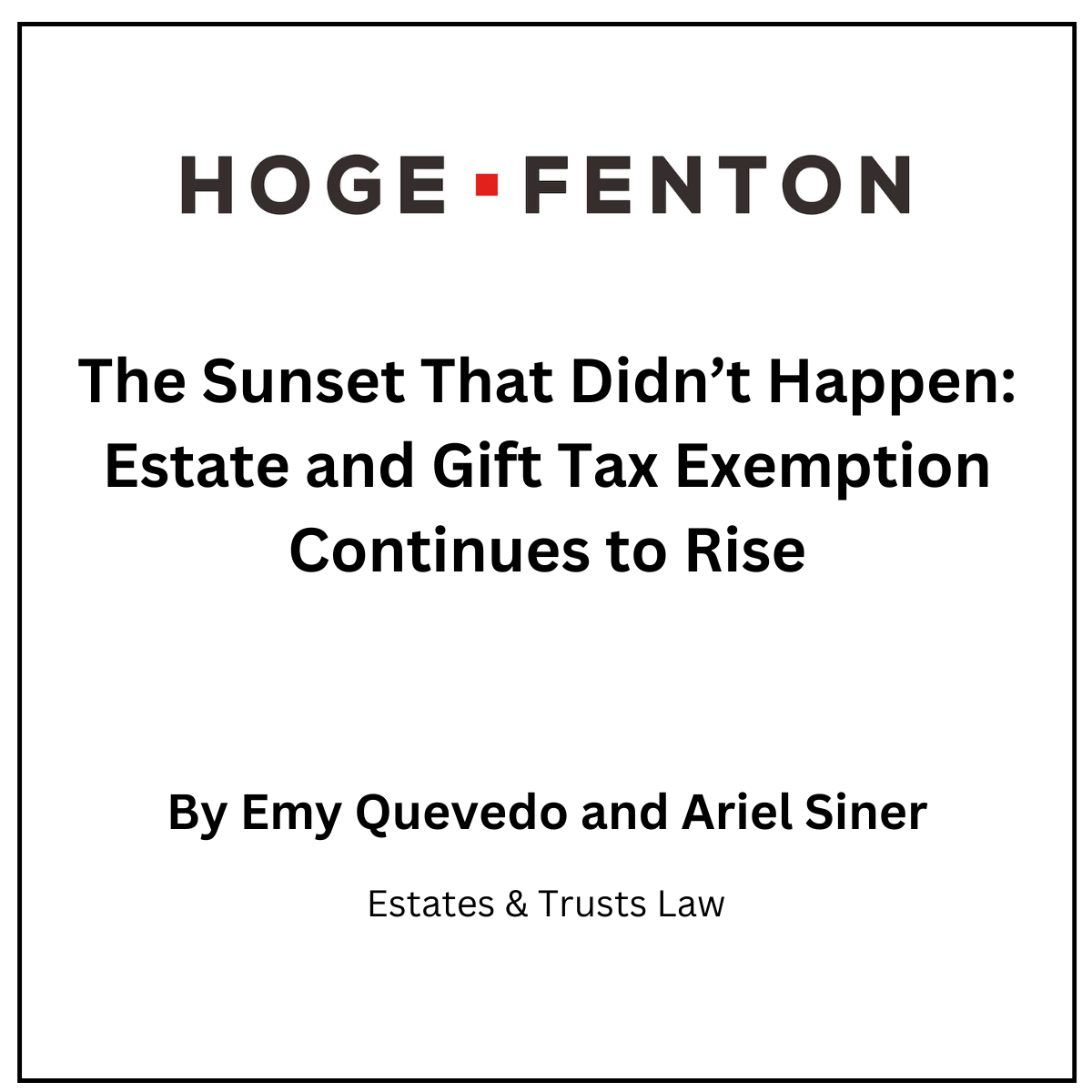The Sunset That Didn’t Happen: Estate and Gift Tax Exemption Continues to Rise
By Ariel G. Siner | 07.25.2025 | Estates and Trusts

The Sunset That Didn’t Happen: Estate and Gift Tax Exemption Continues to Rise
By Emy Quevedo and Ariel Siner. Emy Quevedo is a Summer Law Clerk with Hoge Fenton. She is studying for her Juris Doctorate at the University of the Pacific McGeorge School of Law. Emy received her Bachelor of Arts in International Affairs and Economics from the University of Nevada, Reno.
On July 4, 2025, President Trump signed the “One Big Beautiful Bill Act” (OBBBA) into law. While opinions on the bill vary, one important change brings welcome clarity and permanence to estate and gift tax planning.
What Changed?
Since 2018, the federal estate and gift tax exemption—the amount an individual can gift during life or transfer at death tax-free—has been historically high due to the Tax Cuts and Jobs Act (TCJA). The TCJA doubled the exemption amount from $5M per person (adjusted for inflation) to $10M per person (adjusted for inflation). In 2025, the exemption is $13.99M per person.
Under the TCJA, the enhanced exemption, among other tax provisions, would expire on December 31, 2025. This would return the exemption to $5M per person, adjusted for inflation—anticipated to be approximately $7M per person in 2026. This looming sunset created estate planning uncertainty for many families, especially those with estates in the $10M–$30M range.
Now, under the OBBBA, that sunset has been canceled. Beginning January 1, 2026, the exemption will instead increase to $15M per person and continue to be adjusted for inflation. The generation-skipping transfer (GST) tax exemption will also be updated to match the increased gift and estate tax exemption. These increases and permanent legislation create certainty in future gift and estate tax planning (at least until the next election).
OBBBA’s impact on tax planning goes beyond the exemption, including:
- Continued inflation adjustments for the annual gifting exclusion (currently $19,000 per recipient for 2025).
- State and local tax (SALT) deduction from income taxes is increasing from $10,000 to $40,000, with some limitations, for tax years 2025-2029.
- New “Trump accounts” are individual retirement accounts for minors and a pilot program where the federal government will provide a $1,000 seed deposit for every child born between Dec. 1, 2025—Dec. 31, 2028 with a valid Social Security number. Earnings grow tax-deferred and annual contributions are maxed at $5,000, increasing annually for inflation. No distributions may be made before the child turns 18.
- TCJA income tax brackets for individuals and trusts are made permanent, with some inflation adjustments:
- Individual: 10%, 12%, 22%, 24%, 32%, 35%, and 37%.
- Trust and Estate: 10%, 24%, 35%, and 37%.
- The increased Alternative Minimum Tax (AMT) exemption for trusts is now permanent and the phase-out formula is modified as well.
- The income tax and AMT changes apply to tax years beginning after December 31, 2025.
What This Means for You:
- Individuals with an estate below $15M (or married couples with a combined estate below $30M) will not have an immediate estate tax issue to be concerned about, which provides greater flexibility in estate planning to ensure your wishes are carried out without the added concern of complex tax minimization efforts. Basic planning to avoid probate, provide for incapacity, and determining how assets will be passed to your beneficiaries remains relevant and important.
- Individuals with an estate at or above $15M (or married couples with a combined estate above $30M) are still looking at estate tax of 40% on the value of the estate above the exemption. Advanced planning and gifting techniques should be explored with your advisors in light of your goals, risk tolerance, and overall financial situation.
Time to Review Your Plan?
Even if your plan was created recently, it may reference outdated law or sunset provisions. We recommend reviewing your estate plan with your attorney to ensure that the structure still makes sense in light of this new legislation and your own goals.
If you have questions about how this new law affects you and for personalized advice, please reach out to our Hoge Fenton estate planning team.

















